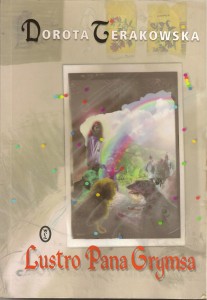„Lustro Pana Grymsa”, Dorota Terakowska "Mirror of Mr. Gryms", Dorota Terakowska
Wyobraźcie sobie, że z waszego otoczenia nagle znika jeden z kolorów tęczy. Na przykład zieleń… Trawa i liście drzew nagle stają zupełnie bezbarwne. Albo błękit – niebo, woda… Czerwień? Wszelkie czerwone kwiaty przestają istnieć, ptaki o czerwonych piórach również tracą prawo bytu, krew… właśnie, krew. Bez czerwonych krwinek wszelkie zwierzęta – w tym człowiek, bo człowiek to jednak „cywilizowane zwierzę” – nagle stają się ospałe, jakby bez życia; aby przetrwać, muszą dosłownie przespać niemal całe swoje życie. Nie są zdolne do jakiegokolwiek większego wysiłku fizycznego, że o mentalnym nie wspomnę. Straszne, czyż nie?
Do takiego właśnie świata – pozbawionego jakiegokolwiek śladu czerwieni, gdzie wszystkie istoty żywe są wiecznie zmęczone – trafia Agata, młoda dziewczyna o płomiennorudych włosach. Jak? Przez lustro, magiczne lustro maga Grymsa, przez które przechodzi, aby odszukać swojego psa; zwierzę dostało się tam wcześniej, tą samą drogą. „Ta, o włosach w tym kolorze,” mówią o niej mieszkańcy, człekokształtne istoty o kolorowych włosach (we wszystkich kolorach tęczy, oprócz wiadomego – na który już nawet nie pamiętają nazwy). Agata, choć sama na początku o tym nie wie, ma ważne zadanie: dzięki niej miejsce, w którym się znajduje, odzyska swoją dawną świetność; nie tylko brakujący kolor, lecz także to, co się z nim wiąże – utracone prawdziwe życie, bo to, co zostało po zniknięciu czerwieni, to zaledwie cień egzystencji. Skąd w posiadaniu głównej bohaterki wzięło się tajemnicze lustro-portal? Czy uda jej się przywrócić tę smutną, znękaną krainę do życia? I… jak to się właściwie stało, że tajemniczy świat nagle został pozbawiony wszystkiego co czerwone? Tego dowiecie się, czytając książkę „Lustro Pana Grymsa” Doroty Terakowskiej; została ona wydana nakładem Wydawnictwa Literackiego.
„Mały pochód, idąc w głąb miasta, mijał po drodze niewielkie grupki przechodniów, którzy na ich widok zatrzymywali się i szeptali z niechętnym zainteresowaniem:
– Przyszła Ta, która miała przyjść… Będą kłopoty… Musiała przyjść, przecież wiecie… Musiała, niestety, ale będą kłopoty. Mogła iść sobie gdzie indziej, do innych miast… Ale czy są inne miasta? Kto wie?… Będą kłopoty… Przyszła Ta…”
Okładka książki (skan)
Cover of the book (scan)
Imagine that one of the colors of the rainbow suddenly disappears from your surroundings. For example, green… Grass and leaves of trees suddenly become completely colourless. Or blue – sky, water… Red? All red flowers cease to exist, birds with red feathers also lose the right to be, blood… right, blood. Without red blood cells all animals – including man, because man is a „civilized animal” – suddenly become sluggish, as if lifeless; to survive, they have to literally sleep through almost all their lives. They are not capable of any greater physical effort, not to mention any mental one. Terrible, isn’t it?
Into such a world – without any trace of red, where all living beings are eternally tired – gets Agata, a young girl with flaming red hair. How? Through the mirror, the magical mirror of sorcerer Gryms, through which she goes to find her dog; the animal got there earlier, the same way. „The One, with hair of that color,” speak of her the inhabitants of it, human-like creatures with colourful hair (in all colors of the rainbow, apart from to the known – for which they do not even remember the name). Agata, although she does not know it at first, has an important task: thanks to her place in which she is will recover its former glory; not only the missing color, but also what is associated with it – the lost real life, because what was left after the disappearance of red is only the shadow of existence. Where did the mysterious mirror-portal come from to the possession of the protagonist? Will she be able to restore this sad, haunted land to life? And… how did it really happen that the mysterious world was suddenly devoid of everything red? You will learn this by reading Dorota Terakowska’s book „Mirror of Mr. Gryms”; it was published by Wydawnictwo Literackie.
„A small parade, walking down the street, passed small groups of passersby, who stopped and whispered with an averse interest:
’The One who was to come has come… There will be trouble… She had to come, you know… She had to, unfortunately, but there will be trouble. She could have gone elsewhere, to the other cities… But are there any other cities? Who knows?… There will be trouble… The One has come…’”






